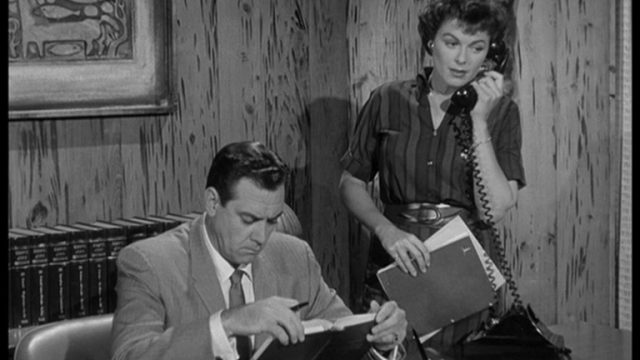I didn’t write an obituary for Barbara Hale, though I could have. It’s just been busy lately. But the fact is, she and Mary Tyler Moore—and recent Celebrating the Living subject Betty White—are all in some ways in the same category for me. Though I’m not sure Mary Tyler Moore would have approved, they and many others are to me among the early feminist icons of television. Even when they were playing wives or secretaries.
I actually collect Perry Mason novels, and to be honest, the role of Della Street is more explicitly feminist to me in the books. She refuses to marry Perry because he’d make her stay home, and she sees him more often—and has more fun—when she’s his secretary. But even on the show, she’s trusted and respected. Not just by Perry, either; all the series regulars approve of her. Yes, all right, Paul Drake persists in calling her “beautiful” whenever he sees her, but even he is aware of her abilities and respects them.
When people think of women in television in that era, I think they’re more likely to call to mind Donna Reed and Barbara Billingsley, women doing housework in pearls. And goodness knows there were enough of those women to be getting on with. I can’t talk about them as much, though, because those shows never much appealed to me. I know a lot more about Cloris Leachman as Phyllis than I do about Cloris Leachman on Lassie, because I always thought Lassie was boring.
The fact is, Perry Mason would’ve been lost if he’d married Della, and we all knew it. No secretary he could’ve hired would’ve been anywhere near as good. That was obvious as we watched the show, and I think it was obvious to my mother and grandmother—the one thing my mother really had in common with my father’s mother was a love of Perry Mason, if you leave aside their love of us and Dad—when they watched it long ago. Women like Della were officially subservient, which made them more okay, but they were more subversive because you could see that they were completely competent and would do better without the men around them than the men would do without them.
And this isn’t a Dumb Sitcom Father situation, either, where the father is completely propped up by the wife. Rob Petrie was many things, but he wasn’t dumb. It’s just that he was lucky to have Laura and he knew it. And I think he made sure she knew it, too. Laura stood out from the other housewives of the era not just because she wore pants instead of pearls but because we always knew that she needed more from life than just running a vacuum and taking care of the kid.
Behind the scenes, Lucille Ball was plenty tough, though she put up with way more from Desi Arnaz than I would have. But Lucy Ricardo was the butt of jokes in a way that never entirely sat well with me. Yes, there are episodes where Laura is the butt of the joke, but sometimes, I watch I Love Lucy and find myself wondering what holds the Ricardos together. Ricky never seems to like Lucy all that much. However, with her wish to get out and do things, she still had more of a feminist streak than many of the era’s other shows.
Feminism wasn’t new to the sixties, goodness knows. Not even the 1860s. But I think the resurgence of feminism owes a lot to people who grew up watching Della Street, Laura Petrie, and so forth. To people who learned that Lucille Ball and Betty White were producers on their own shows. Feminism came into the home in the ’50s, even if it didn’t use that name.

